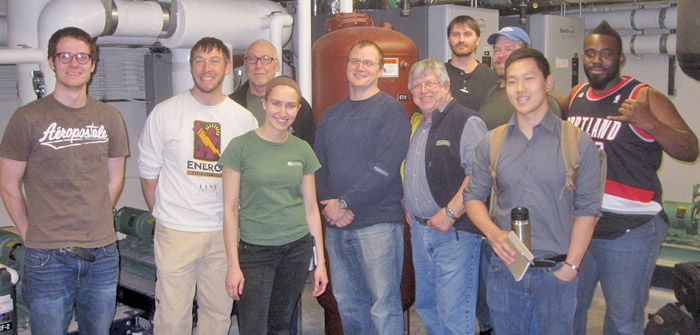(Roger Ebbage with students in a central plant | Photo courtesy of Lane Community College)
When Mia Hocking was hired as the resource conservation manager at the Hillsboro School District in 2018, she knew she needed additional training.
“I had been with the district for 12 years in various roles but did not have a background in energy efficiency or building controls,” Hocking said. “I researched energy efficiency coursework and found the BECA program at Lane Community College.”
Roger Ebbage is the coordinator for the Energy and Water Education, and the Building Energy and Controls Apprenticeship (BECA) programs at Lane Community College in Eugene. He started the BECA program in the fall of 1992 at the request of Bonneville Power who sought trained employees.
Oregon is the first state in the U.S. to create an apprenticeship program designed to get more skilled professionals into the workforce who can help businesses, schools, hospitals and communities operate on less energy.
The BECA program trains students for jobs working to audit commercial buildings, improve building energy efficiency, and program and operate commercial building control systems. Funded by the U.S. Department of Energy, BECA is the first of its kind. The overarching goal is to increase throughput of highly qualified building energy efficiency and control graduates in the Western U.S., who will be prepared to identify and implement energy-saving measures, including controls, in commercial buildings.
Ebbage shared apprentices start at $20 an hour, and the average employed wage for Oregon is $34 an hour. “There is a demand for people who can do this work,” Ebbage shared.
Hocking, 56, said the two-year degree program is online, which allowed her to balance her work and studies. “The program is well-written and it’s inclusive of all the aspects of energy efficiency. The comprehensive program built a solid foundation for me,” Hocking said. “Everything I learned I am able to use in my daily work.”
Hocking added her school district has implemented measures to better manage the energy used in the buildings. She is working with Ebbage to add elements of the program to the district’s Career and Technology Education programs. “Many high school seniors do not have a clear vision of what they want to do after graduating,” Hocking said. “This program is very achievable, and it is pocket friendly. More importantly, there is a demand for people to do these jobs.”
Ebbage said the BECA program provides students with the knowledge and experience to succeed in the workforce. The state’s Bureau of Labor and Industries recently approved the Western States Building Energy & Controls Apprenticeship (BECA) program, created by Lane Community College in partnership with many others.
The two-year degree program includes 2,000 hours of a paid apprenticeship. Energy Trust of Oregon is offering scholarships to the program for underserved populations. “This is the only program of its kind in the Northwest, and there are only a handful in the U.S.,” Ebbage said. “I appreciate Energy Trust of Oregon for believing in the program and for providing scholarships.”
Ebbage said students are trained to understand how buildings operate and how to make recommendations on how to operate it in a more energy efficient way. They do this by learning how to analyze the building’s structure and systems, to collect data and to make evaluations.
“They also learn how to operate digital control systems for a building,” Ebbage said. “An employee could be in Bend and control the air flow to heating in a building to the lighting in Eugene.”





